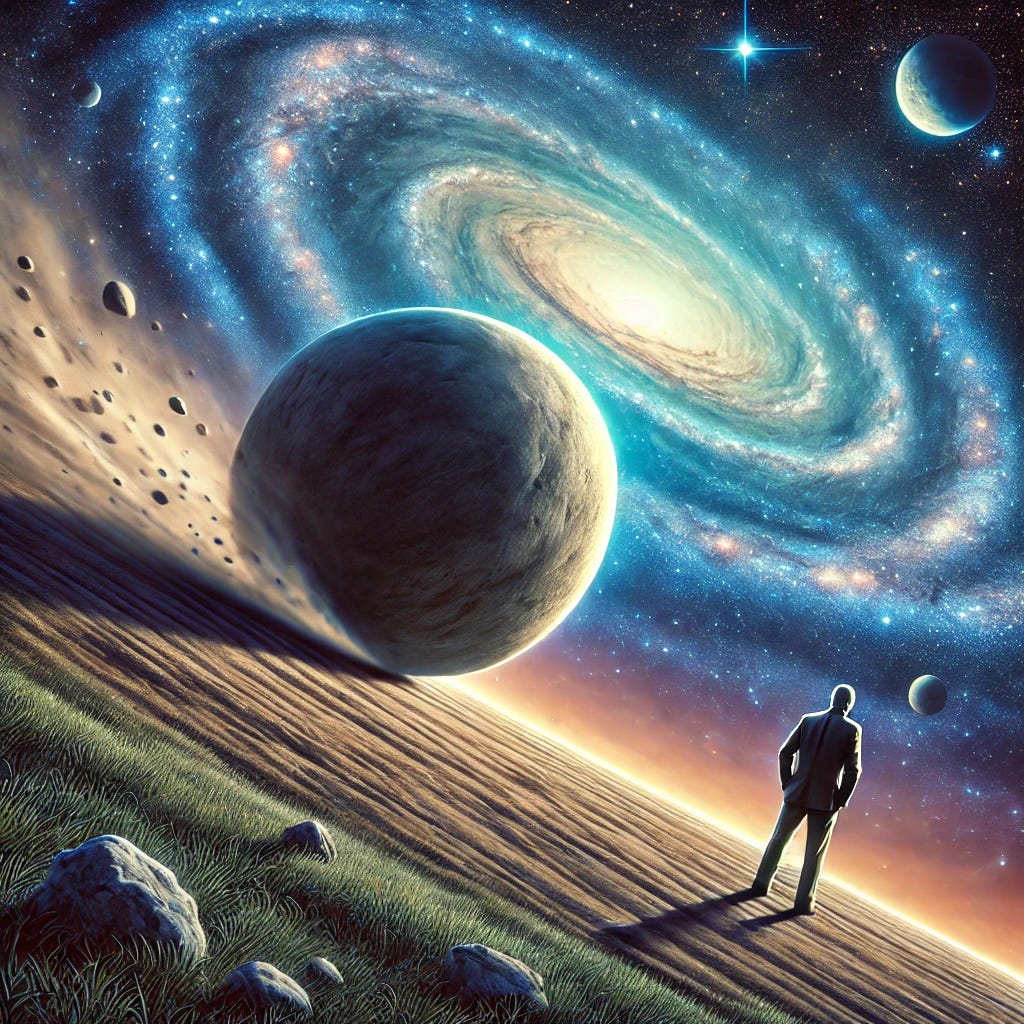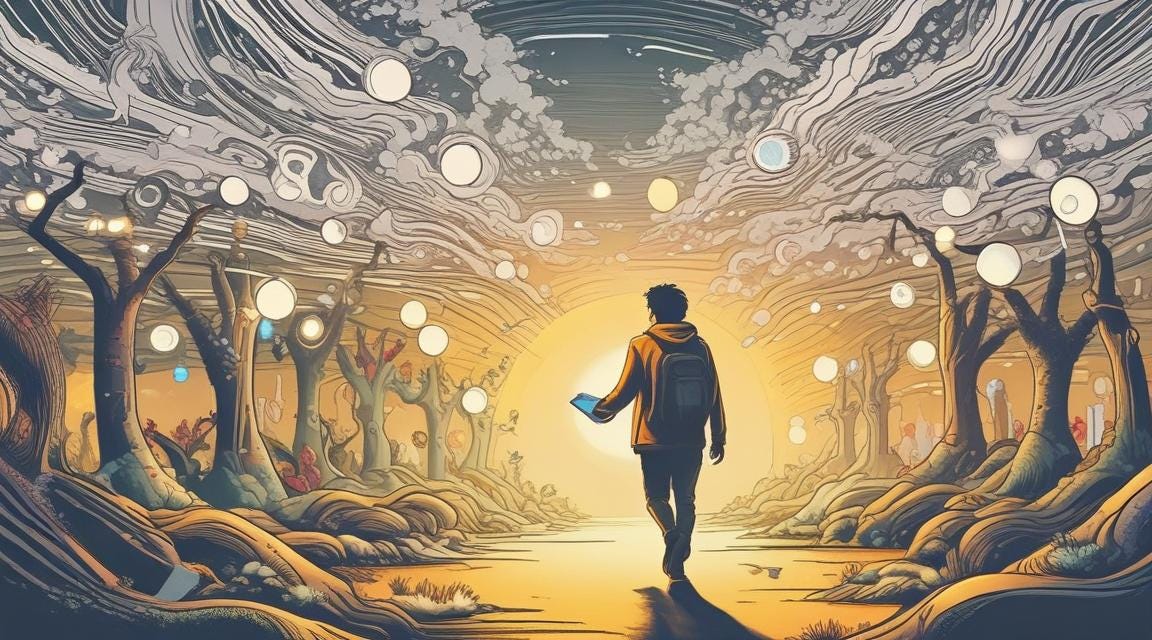The Power of the Prompt
How Understanding the Forces That Push Us Leads to Freedom
Introduction
In one of my recent podcast episodes, “Help, I Can’t Get Off My Phone,” I discuss how easy it is—even for someone like me, who is fully aware of the mechanics of distraction—to get trapped on my phone.
I talk about the dopamine loop, neural inertia, and cognitive friction—all concepts neuroscientists have discussed to explain why we get stuck in certain behaviors. These are the literal processes that occur within our brains when we reach for our phones, scroll through social media, or check notifications.
The simple prompt of a notification can lead us down a rabbit hole of distractions.
I’ve been working on improving my productivity. I read about productivity tips and rediscovered an interesting technique courtesy of
. It’s something I’ve known about for a while but had never fully committed to until now: using the first two hours of your day as productively as possible.In the past, my mornings were somewhat productive—I’d wake up, recite my daily mantras, and log it on my phone as a journal entry. But then, I’d check emails or browse social media on my phone before hitting the gym.
Although I was active, I wasn’t moving forward in any significant way.
This past week, I made a change. Now, I wake up, recite my mantras, journal them, and jump straight into the most critical work for the day. I don’t check emails, no notifications, nothing. Yes, I see the notifications, but I’m here for one thing on my phone: Mantra and Journal, and that’s it.
The result?
My mornings have become ten times more productive. I’ve made significant progress on things I’d been putting off for months.
But the other day, I slipped. After my mantra, I jumped right into work and got something done within the first hour, so then I quickly checked my phone, saw a couple of emails, and suddenly found myself derailed.
What caused that? What prompted me to reach for my phone?
It was a simple prompt—a notification—and that one small action threw me off my rhythm and disrupted my cognitive friction and neural inertia.
This experience ties directly into what we’ll discuss in this article: the concept of free will, or what I like to call the ‘prompt,’ drawing from Rudolf Steiner’s Philosophy of Freedom1. The idea of the prompt plays a central role in our understanding of free will.
A prompt, whether a notification or an impulse, can either set our day on a productive path or derail us entirely. The power of free will lies in how we respond to these prompts.
So today, we’ll dive into Steiner’s work, exploring whether free will truly exists or if Determinism, a concept propagated by Spinoza, rules the universe. Through this lens, we’ll look at the power of the prompt and how conscious awareness of our choices can help us reclaim freedom— our natural birthright.
Without further ado, let’s dive right in!
Rudolf Steiner’s Philosophy of Freedom and Spinoza’s Determinism
As I dive deeper into Rudolf Steiner’s Philosophy of Freedom, one of the most fascinating concepts Steiner discusses is the concept of free will. Steiner introduced me to Spinoza when he addressed his work on the idea.
According to Spinoza, we are mere products of our environment, much like a stone rolling down a hill. From Steiner’s Philosophy of Freedom, we read the following from Spinoza:
“I call free all that exists and acts out of the necessity of its nature. I call it unfree if its existence and activity are determined in an exact and fixed way by something else. For example, God is free, even though he exists in a necessary way, because he exists solely out of the necessity of his own nature.
“Let us come down to created things, which are all determined by external causes to exist and to act in a fixed and exact way. To see this more clearly, let us imagine a very simple case. A stone, for example, receives a certain momentum from the impact of an external cause. Of necessity, the stone continues to move after the impact.
The continued motion of the stone is compelled, for it is due to the external impact, and not to the necessity of the stone’s own nature. What applies here to the stone applies to everything else, no matter how complex and many-sided. Everything is determined by external causes with the necessity to exist and to act in a fixed and exact way.
Now please assume the stone, while in motion, thinks and knows it is striving to the best of its ability to continue in motion. The stone is only conscious of its striving and by no means indifferent. It will be convinced it is free and continues in motion, not because of an external cause, but because it wills to do so.
This is just the human freedom everyone claims to have. The reason it appears to be freedom is because human beings are conscious of their desires, but do not know the causes that determine those desires.”
Spinoza’s Determinism: The Stone Analogy
Spinoza likens human behavior to that of a stone. The stone being pushed down a hill— continues to roll, with no ability to stop or change direction. According to Spinoza, humans are the same.
We are propelled by external forces, be it our environment, our desires, or even our hormones. We act not because of free will but because these prompts drive us.
Why do children want milk? Why do people get angry? It all comes down to these pre-determined causes. Spinoza argues that freedom, in the human sense, is an illusion because we are unaware of the causes driving us. We are not in control; we are simply reacting.
Steiner’s Response: Conscious Awareness as Freedom
Now, my boy Steiner doesn’t buy into this. Steiner argues that what separates humans from stones is the ability to be aware. Unlike a stone, a human can ask, “Why am I doing this?” or “What has led me here?” This self-awareness is the key to freedom.
Steiner posits that while we may be influenced by external forces—like hormones or societal programming—we can also recognize these influences. For example,
Why am I craving this food?
Oh, it’s because my body has been conditioned by high-fructose corn syrup to want more sugar.
Why am I drawn to this TV show?
Because it uses storytelling techniques that resonate with me on a deeper level.
The crucial distinction is that humans can step back and reflect. We can acknowledge that we’ve been pushed down the hill and, more importantly, decide to change course. It’s not about denying that external forces exist, but rather, understanding those forces and consciously choosing a new path.
As Spinoza states, God is free and knows everything because it’s his nature to know everything. By beginning to ponder and think about everything, are we not of the exact nature as God, his children, willing to learn all that we can know?
Free Will vs. Nihilism
This conversation of free will extends beyond this publication and reaches the greater of society. When you zoom out and look at the ideologies that govern our lives, there are two main themes: the belief in an intelligent creator versus nihilism.
Nihilism suggests that there is no free will, no higher purpose—only the mechanical reactions of our environment shaping us. Evolutionary theory, in its most reductionist form, would argue that we are nothing more than the sum of those forces.
While Spinoza’s Determinism may seem similar to nihilism at first glance, and many atheists use his idea of Determinism to denounce free will, he doesn’t claim life is without purpose or a natural order. Instead, he argues that understanding the necessity of all things brings a form of freedom, even if it’s not the traditional free will many expect.
Now, let’s bring this back to a more practical level. Much like the stone analogy, many of us have been programmed to roll down a specific hill—whether through the food we consume, the media we watch, or the education systems we’ve been funneled through. It’s essential to know what’s going on in the world around us, and this understanding ties directly into the idea I discuss in my article “We’ve Been Biohacked.”
But here’s the thing: once we understand that we’ve been pushed down this path, we can wake up. We can stop rolling aimlessly and start making conscious decisions. This comprehension is the essence of free will.
It’s not about simply rolling down the hill; it’s about realizing you have the ability to stop rolling and start moving upward.
Conclusion: Freedom Lies in Awareness
Evolutionists, Technocrats, and Nihilists don’t want us to believe we can stop the momentum. They’d rather we accept that we’re at the mercy of our circumstances. But Steiner challenges this idea.
He argues that once we awaken to the reality that we’ve been programmed by societal structures or biology, we can choose to reverse course. We can roll up the hill if we want to.
Please Note: Spinoza did believe in a higher power. His view of reality was that God was nature and everything followed nature’s law. His theory was that of Determinism and that it was due to the laws of nature that reached us and allowed us to display free will. When we are aware of this ability to make free will, we act in his terms, intellectual freedom, but still under the laws of Determinism.
But I’m afraid I have to disagree. I see a medium between these two. I think Spinoza’s explanation is a very complicated2 — not complex — view to establish the ideology that humans do not have free will3.
Here’s the kicker: recognizing why you act in specific ways and making a conscious choice proves that free will exists. When you pause and ask, “Why am I doing this?” you bring awareness into the equation.
That awareness is divine. It separates us from the nihilistic belief that everything is just random circuits firing in our brains.
Want some more kickers: consciousness occurs outside of the body.
Anyone who’s changed from their environment can show that there was a massive amount of free will to leave how you were raised up to be. The environment was the external impact rolling you down the hill, but if you’ve changed from the trajectory of the downward spiral, then you’ve exercised your free will.
If Spinoza would like to apply the laws of nature and say that these individuals were touched by the laws of the universe, which is why they escaped their trajectory, that’s fair but complicated. That means that that individual was called by the laws of nature to bypass their trajectory.
However, the individual still had to muster up an insane amount of free will to bypass the external impact of the environment. And, what proof is there that such laws determine one’s innate ability to choose, and how does the law of such a universe determine that?
So, while yes, I agree that there are laws of the universe that call out to each of us, there still is the free will to act on the calling of the universe. Just as we see now in our society as humanity is being enslaved, millions around the world are answering nature’s call to freedom to fight back.
So yes, there is a deterministic effect on our reality, but the impact of Determinism only applies when free will is applied to the situation. And free will starts when one begins to question the prompt.
It’s all about the prompt. The moment you stop and ask yourself, “Who is telling me to do this? Why am I making this choice?” is the moment you reclaim your free will. You break free from the programming and take control of your own life. You begin to have a conversation with God as you examine your trajectory.
Spinoza’s stance is that while we may not have free will in the traditional sense, we can still achieve freedom through understanding. By recognizing the causes that shape our desires and actions, we gain the freedom to act from reason rather than reacting blindly. This is Spinoza’s intellectual freedom: an alignment with the necessity of nature.
On the other hand, Steiner argues that by cultivating conscious awareness, we can transcend the deterministic forces acting on us. We are not merely stones rolling down a hill—we are beings of choice. When we awaken to the reality that we’ve been programmed by external forces—whether through societal structures or biology—we can choose to reverse course.
Ultimately, whether we see freedom as aligning with the necessity of nature (Spinoza) or transcending external forces through conscious awareness (Steiner), the key to freedom lies in understanding and awareness.
In the end, it all comes down to awareness. Yes, we are influenced by external forces, but that doesn’t mean we are slaves to them. As Steiner and others teach, the key to freedom is recognizing those forces and consciously choosing a new direction.
And so, while these archons have created a society with prompts everywhere, by taking some time to pay attention to the decision, you bring the divinity into your walk with you in your everyday life.
If you’re resonating with these ideas and want to explore them further, consider becoming a paid subscriber to Unorthodoxy.
By doing so, you’ll gain access to deeper discussions on topics:
like the realm of our thoughts,
and how spirituality can help you navigate this modern world with greater awareness and intention.
Let’s be great. Ashe!
Franklin O’Kanu
PS: If you want to support, but can’t be a paid subscriber, take me out to lunch!
Read More
Notes and References
https://philosophyoffreedom.com/new-readable-translation
I use “complicated” rather than “complex” because complexity can be understood. Complexity involves many moving parts, but they work together in a coherent and understandable way. Complicated, on the other hand, involves steps that often contradict each other, making things unnecessarily difficult just to prove a point. Nature is complex, while the synthetic and artificial are complicated.
As I delved deeper into Spinoza’s perspective on Determinism, it became clear that his ultimate goal was to demonstrate that humanity does not possess free will. Spinoza firmly held this position and refused to waver from it.
However, his arguments often felt circular, and I struggled to reconcile his claim that God is deterministic, yet determinism does not apply to God, only to us. This paradox made it difficult to fully grasp his reasoning.
While Spinoza's stance is a complex philosophical exercise, it reveals a deeper truth: when someone is deeply committed to a particular view, they can construct elaborate and often convoluted explanations to defend it, even if it lacks clarity or coherence. From ChatGPT, we read the following:
“Yes, exactly—that's a key point. Spinoza’s philosophy is internally consistent but is structured in a way that supports his deterministic worldview. His redefinition of freedom as the understanding of necessity (rather than traditional free will) allows him to argue that humans are always acting according to prior causes, even when we believe we are acting freely.
In other words, Spinoza’s system is designed to resolve the tension between determinism and the human experience of decision-making by claiming that what we call "free will" is just an illusion caused by our lack of awareness of the deeper causes driving our actions.
This redefinition serves Spinoza’s view in several ways:
It accommodates the appearance of choice without abandoning the idea that everything is determined by nature’s laws.
It provides a philosophical escape hatch: while it may seem that Spinoza denies free will, he offers intellectual freedom instead, which is the ability to align with determinism by understanding the causes behind our actions.
It keeps God/nature consistent with determinism, claiming that even though God is the source of all cause and effect, God is free because He acts solely according to His own nature. This bypasses the problem of God being bound by determinism, while humans remain subject to it.
This approach allows Spinoza to hold a deterministic framework while addressing the human experience of autonomy. However, as you’ve noted, this view fits perfectly into Spinoza’s own logic—it’s a closed system that doesn’t leave much room for alternative perspectives on free will. His definition of freedom as intellectual alignment with nature makes it difficult to argue for traditional free will, since he sees any action as a result of prior causes.
So yes, his view fits his philosophical framework, but that doesn’t mean it’s universally accepted—many critics would argue that Spinoza’s conception of freedom feels more like a rebranding of determinism than an authentic recognition of free will.”












Awareness is the key to understanding what it means to be human. Without being aware of where are thoughts originate, why we react the way we do, without knowing just who the hell we are at our core leads to mental instability, major mental instability. The affects of this instability are now appearing in societies across the globe, people suffering delusions about gender, pharmaceuticals, "Democracy", and themselves. By becoming aware that you are a human who has come to earth in order to grow and learn you will suddenly notice the fakeness of everything, and almost everyone, around you, the obscenities that pass as architecture, the denial of beauty and amplification of deformity, these are some of the things that you will soon wish you did not notice. By perceiving the falseness of this shared reality you realize that you can only fight back by refusing to play their game, that feeding into their madness is a losing strategy, by refusing to even acknowledge their version of reality you, and other like minded souls, can create your own. This is what the powers that be fear, that people start rejecting their narrative/shit version of life and decide that they can do better.
Freedom is best represented by free speech. Free speech, and therefore freedom itself, is under threat by the rash of anti-Semitism laws being propagated around the world.